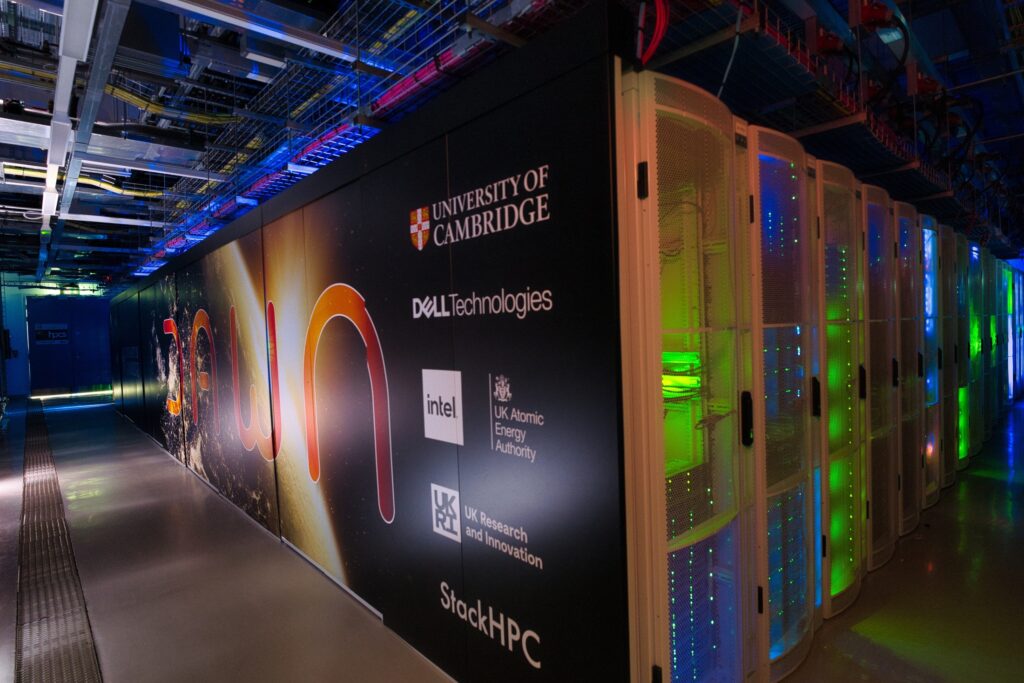Dell, Intel, and the University of Cambridge have jointly announced the introduction of the Dawn Phase 1 supercomputer.
This cutting-edge AI supercomputer is currently the fastest supercomputer of its kind in the UK. It represents a breakthrough fusion of AI and high-performance computing (HPC) technologies, showing the potential to tackle some of the world's most pressing challenges.
Dawn Phase 1 is the foundation of the recently launched UK AI Research Resource (AIRR), demonstrating the country's commitment to exploring innovative systems and architectures.
This supercomputer brings the UK closer to achieving exascale. Calculation threshold for 10 quintillion (10^18) floating point operations per second. To put this in perspective, the processing power of an exascale system is equivalent to what it would take him over four years if every person on Earth worked nonstop 24 hours a day.
Powered by the Cambridge Open Zettascale Lab, Dawn utilizes Dell PowerEdge XE9640 servers, providing an unparalleled platform for Intel Data Center GPU Max series accelerators. This collaboration ensures a diverse ecosystem through oneAPI and fosters an environment of choice.
The system's capabilities span a variety of areas, including healthcare, engineering, green fusion energy, climate modeling, cosmology, and high-energy physics.
Adam Roe, EMEA HPC technical director at Intel, said:
“Dawn significantly increases the scientific and AI computing power available in the UK and is on the ground today. Cambridge Open Zettascale Lab.
The Dell PowerEdge XE9640 server provides a no-compromise platform to host Intel Data Center GPU Max series accelerators and expands ecosystem choice through oneAPI.
We are very excited to see what kind of early science this machine can deliver and look forward to continuing to strengthen the Open Zettascale Lab partnership between Dell Technologies, Intel and the University of Cambridge and extend it further to the UK science and AI community. I will continue to do so. ”
glimpse of the future
Dawn Phase 1 is more than just a standalone achievement. It's part of a broader strategy.
This joint effort aims to deliver a Phase 2 supercomputer in 2024, promising 10x performance levels. This progress will drive the UK’s AI capabilities and strengthen successful industry partnerships.
The technological foundation of the supercomputer is the Dell PowerEdge XE9640 server, known for its versatile configurations and efficient liquid cooling technology. This innovation ensures optimal processing of AI and HPC workloads, providing a more effective solution than traditional air cooling systems.
Tariq Hussain, Head of UK Public Sector at Dell, commented:
“Collaborations like the University of Cambridge, Dell Technologies and Intel, and strong inward investment are essential to unlocking the UK’s high-growth AI potential through computing. To lead the way, it is paramount that governments invest in the right technology and infrastructure.
It's also important to embrace the full scope of the technology ecosystem, including GPU diversity, to ensure our customers meet the growing demand for generative AI, industrial simulation modeling, and groundbreaking scientific research. ”
As the world awaits full technical details and performance figures for Dawn Phase 1, due to be released in mid-November at the Supercomputing 23 (SC23) conference in Denver, Colorado, the UK is excited about the transformational era in science and AI. standing on the edge of a cliff. the study.
This collaboration between industry giants and academia will not only accelerate research discoveries, but also drive the UK's knowledge economy to new heights.
(Image credit: Joe Bishop of Cambridge Open Zettascale Lab)
See also: UK paper highlights AI risks ahead of global safety summit

Want to learn more about AI and big data from industry leaders? Check out the AI & Big Data Expos in Amsterdam, California, and London. This comprehensive event coincides with Digital Transformation Week.
Learn about other upcoming enterprise technology events and webinars from TechForge here.


